Advance ship notice asn - Study guides, Class notes & Summaries
Looking for the best study guides, study notes and summaries about Advance ship notice asn? On this page you'll find 29 study documents about Advance ship notice asn.
Page 2 out of 29 results
Sort by
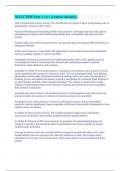
-
2024 CPIM Part 1 (A+ Graded Already)
- Exam (elaborations) • 40 pages • 2024
- Available in package deal
-
- $14.49
- + learn more
ABC CLassification correct answers The classification of a group of items in decreasing order of annual dollar volume or other criteria Advanced Planning and Scheduling (APS) correct answers Techniques that deal with analysis and planning of logistics and manufacturing during short, intermediate, and long-term time periods Advance ship notice (ASN) correct answers An electronic data interchange (EDI) notification of shipment of product. Andon correct answers A sign board with signal lig...
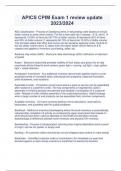
-
APICS CPIM Exam 1 review update 2023/2024
- Exam (elaborations) • 15 pages • 2023
-
- $10.49
- + learn more
APICS CPIM Exam 1 review update 2023/2024 ABC classification - Process of classifying items in descending order based on annual dollar volume or some other criteria. The list is then split into 3 classes - A, B, and C. A represents 10-20% of items but 50-70% of dollar volume; B represents 20% of items and 20% of dollar volume; C represents 60-70% of items but 10-30% of dollar volume. This principle states that effort and money can be saved by applying looser controls to the low dollar volume ...
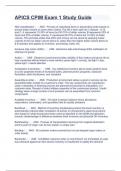
-
APICS CPIM Exam 1 Study Guide
- Exam (elaborations) • 16 pages • 2023
-
- $17.99
- + learn more
ABC classification - ANS Process of classifying items in descending order based on annual dollar volume or some other criteria. The list is then split into 3 classes - A, B, and C. A represents 10-20% of items but 50-70% of dollar volume; B represents 20% of items and 20% of dollar volume; C represents 60-70% of items but 10-30% of dollar volume. This principle states that effort and money can be saved by applying looser controls to the low dollar volume items (C class) than the higher do...
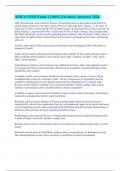
-
APICS CPIM Exam 1 (100% Errorless Answers) 2024.
- Exam (elaborations) • 15 pages • 2024
- Available in package deal
-
- $11.99
- + learn more
ABC classification correct answers Process of classifying items in descending order based on annual dollar volume or some other criteria. The list is then split into 3 classes - A, B, and C. A represents 10-20% of items but 50-70% of dollar volume; B represents 20% of items and 20% of dollar volume; C represents 60-70% of items but 10-30% of dollar volume. This principle states that effort and money can be saved by applying looser controls to the low dollar volume items (C class) than the higher...
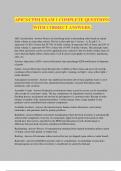
-
APICS/CPIM EXAM 1 COMPLETE QUESTIONS WITH CORRECT ANSWERS
- Exam (elaborations) • 14 pages • 2024
- Available in package deal
-
- $12.49
- + learn more
APICS/CPIM EXAM 1 COMPLETE QUESTIONS WITH CORRECT ANSWERS. ABC classification -Answer-Process of classifying items in descending order based on annual dollar volume or some other criteria. The list is then split into 3 classes - A, B, and C. A represents 10-20% of items but 50-70% of dollar volume; B represents 20% of items and 20% of dollar volume; C represents 60-70% of items but 10-30% of dollar volume. This principle states that effort and money can be saved by applying looser controls...
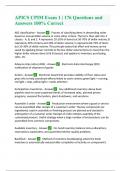
-
APICS CPIM Exam 1 | 176 Questions and Answers 100% Correct
- Exam (elaborations) • 21 pages • 2023
- Available in package deal
-
- $12.49
- + learn more
APICS CPIM Exam 1 | 176 Questions and Answers 100% Correct
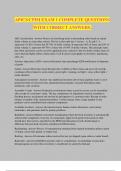
-
APICS/CPIM EXAM 1 COMPLETE QUESTIONS WITH CORRECT ANSWERS.
- Exam (elaborations) • 14 pages • 2024
- Available in package deal
-
- $12.49
- + learn more
APICS/CPIM EXAM 1 COMPLETE QUESTIONS WITH CORRECT ANSWERS. ABC classification -Answer-Process of classifying items in descending order based on annual dollar volume or some other criteria. The list is then split into 3 classes - A, B, and C. A represents 10-20% of items but 50-70% of dollar volume; B represents 20% of items and 20% of dollar volume; C represents 60-70% of items but 10-30% of dollar volume. This principle states that effort and money can be saved by applying looser controls...
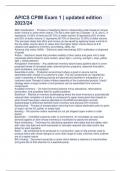
-
APICS CPIM Exam 1 | updated edition 2023/24
- Exam (elaborations) • 12 pages • 2023
-
- $9.49
- + learn more
APICS CPIM Exam 1 | updated edition 2023/24 ABC classification - Process of classifying items in descending order based on annual dollar volume or some other criteria. The list is then split into 3 classes - A, B, and C. A represents 10-20% of items but 50-70% of dollar volume; B represents 20% of items and 20% of dollar volume; C represents 60-70% of items but 10-30% of dollar volume. This principle states that effort and money can be saved by applying looser controls to the low dollar volu...
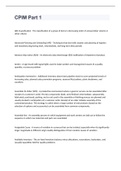
-
CPIM Part 1 EXAM WITH COMPLETE ANSWERS 2023
- Exam (elaborations) • 50 pages • 2023
- Available in package deal
-
- $11.99
- + learn more
ABC CLassification The classification of a group of items in decreasing order of annual dollar volume or other criteria Advanced Planning and Scheduling (APS) Techniques that deal with analysis and planning of logistics and manufacturing during short, intermediate, and long-term time periods Advance ship notice (ASN) An electronic data interchange (EDI) notification of shipment of product. Andon A sign board with signal lights used to make workers and management aware of...
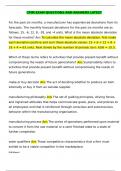
-
CPIM Exam Questions and Answers latest
- Exam (elaborations) • 142 pages • 2024
-
- $10.99
- + learn more
CPIM EXAM QUESTIONS AND ANSWERS LATEST For the past six months, a manufacturer has experienced deviations from its forecasts. The monthly forecast deviations for the past six months are as follows: 15, -6, 12, 8, -18, and -4 units. What is the mean absolute deviation for these months? Ans To calculate the mean absolute deviation, first make each deviation positive and sum these absolute values: 15 + 6 + 12 + 8 + 18 + 4 = 63 units. Next divide by the number of periods (six): 63/6 = 10.5. Wh...

How did he do that? By selling his study resources on Stuvia. Try it yourself! Discover all about earning on Stuvia


